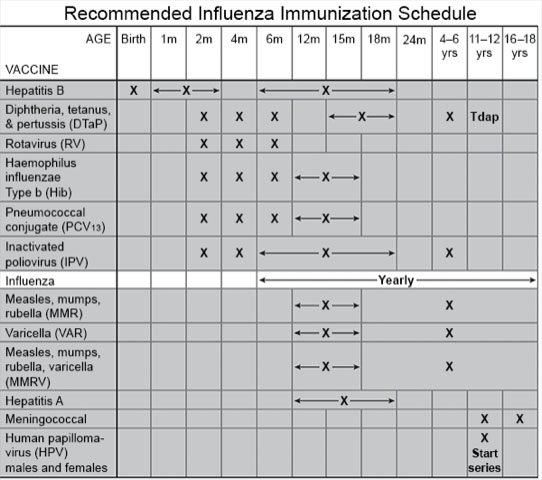Flu Shot (Vaccine) for Children
Medically reviewed by Drugs.com. Last updated on Apr 6, 2025.
What is the flu shot?
The flu shot is a vaccine given in your child's upper arm or thigh to prevent influenza (the flu). The flu is caused by a virus. The virus spreads through direct contact with someone who has the flu. For example, a person with the virus on his or her hands can spread it by shaking hands with someone. Several types of viruses cause the flu. The viruses change over time, so new vaccines are made each year. The vaccine begins to protect your child about 2 weeks after he or she gets it. The flu shot can be given to children who are 6 months or older.
When should my child get a flu vaccine?
Your child should get the vaccine as soon as recommended each year, usually starting in September or October. Children 6 months through 8 years old may need 2 doses. The 2 doses should be given at least 4 weeks apart. The second dose should be given by the end of October. Your child can then usually receive 1 dose each year. Your child's healthcare provider will tell you if your child needs more than 1 dose for any reason.
 |
What should I tell my child's doctor before my child gets a flu shot?
- Your child has any allergies.
- Your child has a health condition, such as diabetes or asthma.
- Your child developed Guillain-Barré syndrome within 6 weeks of getting a flu vaccine. Your child may not be able to get any flu vaccine unless the provider feels the benefits outweigh the risks.
- Your child has or is in close personal contact with someone who has a weakened immune system.
Who should not get the flu shot or should wait to get it?
Your child may need to wait to get the flu shot or instead get the nasal spray. Tell the healthcare provider if:
- Your child is younger than 6 months.
- Your child had an allergic reaction to the flu shot or any part of it.
- Your child is sick or has a fever of 101°F (38.3°C) or higher.
- Your child is allergic to thimerosal (mercury). Your child may need to get a flu vaccine that does not contain thimerosal.
Drugs used to treat this and similar conditions
Tamiflu
Tamiflu is an antiviral medication used to treat flu symptoms caused by influenza. Learn about side ...
Cefdinir
Cefdinir systemic is used for bacterial infection, bronchitis, middle ear infections, pneumonia ...
Omvoh
Omvoh is used to treat moderate to severe ulcerative colitis or Crohn's disease in adults. This ...
Amoxicillin/clavulanate
Amoxicillin and clavulanate potassium is a combination antibiotic used to treat bacterial ...
Rimantadine
Rimantadine systemic is used for influenza a, influenza prophylaxis
Prednisone
Prednisone is used to treat allergic disorders, ulcerative colitis, psoriasis and arthritis. Learn ...
Ondansetron
Ondansetron is used to prevent nausea and vomiting caused by surgery, chemotherapy, or radiation by ...
Simethicone
Simethicone systemic is used for endoscopy or radiology premedication, functional gastric disorder ...
Ciprodex
Ciprodex (ciprofloxacin and dexamethasone) is used to treat ear infections. Includes Ciprodex side ...
Oseltamivir
Oseltamivir is an antiviral medication that blocks the actions of influenza virus types A and B ...
What are the risks of the flu shot?
The vaccine may cause mild symptoms, such as a fever, headache, and muscle aches. Your child may also have mild to moderate soreness or redness at the area where the shot was given. Your child may still get the flu after he or she receives the vaccine. Your child may have an allergic reaction to the vaccine. This can be life-threatening.
Call your local emergency number (911 in the US) if:
- Your child's mouth and throat are swollen.
- Your child is wheezing or having trouble breathing.
- Your child has chest pain or his or her heart is beating faster than normal.
- Your child feels like he or she is going to faint.
When should I seek immediate care?
- Your child's face is red or swollen.
- Your child has hives that spread over his or her body.
When should I call my child's doctor?
- Your child feels weak or dizzy.
- Your child has increased pain, redness, or swelling around the area where the shot was given.
- You have questions or concerns about your child's flu shot.
Care Agreement
You have the right to help plan your child's care. Learn about your child's health condition and how it may be treated. Discuss treatment options with your child's healthcare providers to decide what care you want for your child. The above information is an educational aid only. It is not intended as medical advice for individual conditions or treatments. Talk to your doctor, nurse or pharmacist before following any medical regimen to see if it is safe and effective for you.© Copyright Merative 2025 Information is for End User's use only and may not be sold, redistributed or otherwise used for commercial purposes.
Further information
Always consult your healthcare provider to ensure the information displayed on this page applies to your personal circumstances.
